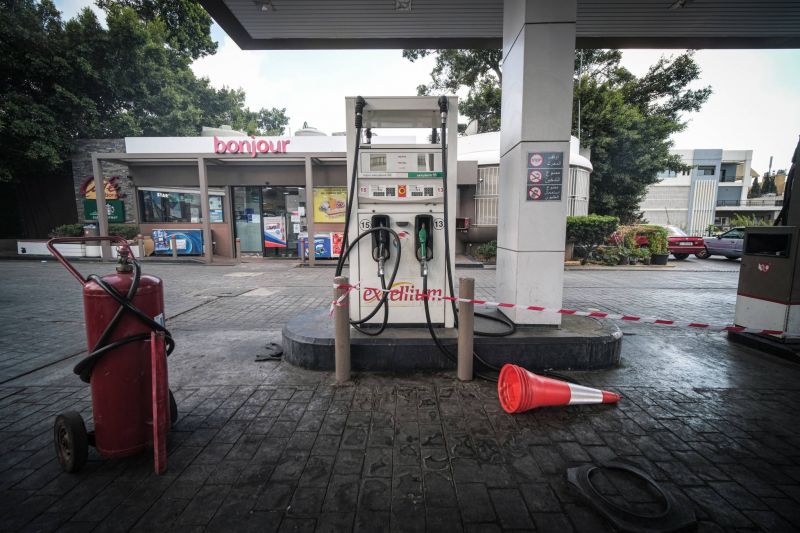
Lebanon has faced a series of fuel shortages this year as the central bank runs low on foreign currency needed for imports. (Credit: João Sousa/L’Orient Today)
Want to get the Morning Brief by email? Click here to sign up.
Banque du Liban announced late yesterday that it will no longer subsidize fuel imports. In a statement, Lebanon’s central bank said it will now provide US dollars to finance fuel imports only at the “market” exchange rate. A BDL spokesperson told L’Orient Today that the central bank will finance fuel imports at the parallel exchange rate, which currently stands at about LL20,500. However, the Energy Ministry will be tasked with setting the new fuel prices. While the decision purportedly aims to cut down on fuel smuggling as BDL’s foreign currency reserves reach a critical threshold, it will bite hard for Lebanese residents already faced with soaring inflation. The new pricing mechanism means that fuel prices may jump as much as five times or more.
Meanwhile, electricity blackouts stemming from shortages of diesel, needed to power private generators during public electricity cuts, have wrought havoc on private and public establishments throughout the country. The head of the restaurant and bar syndicate, Tony Ramy, yesterday warned again of a total paralysis in the tourism sector in case diesel shortages continue. The syndicate had already announced a state of emergency three weeks ago amid countrywide diesel shortages, “but no one heard our call,” Ramy said in a statement, adding that chain restaurants will close half their branches in Lebanon to help manage. A restaurant owner in Beirut’s Hamra area told L’Orient Today that he is able to secure diesel for his generator only from the black market and in quantities “not enough to generate power for more than a few hours.” Also yesterday, the president of North Lebanon’s bakery union announced that many bakeries in the region were at risk of having to shutter as mills are unable to deliver flour due to diesel shortages. Meanwhile, the National Social Security Fund’s Nabatieh offices announced they would shut until further notice because the diesel shortages were preventing their computers and fans from running.
Residents aged 24 and up will now be eligible to receive their first shot of the Pfizer-BioNTech COVID-19 vaccine. “After covering the 30 to 49 age group with AstraZeneca and those over 50 with Pfizer, the Health Ministry is launching a Pfizer vaccination campaign for people born between 1992–97 and registered on the platform by July 31,” caretaker Health Minister Hamad Hassan tweeted. Appointments will be given to residents in this age range who signed up on the Impact platform before August. Hassan also said youngsters aged 12 and older can now register on the Impact platform. Till now, just over a quarter of residents have received a COVID-19 shot. Meanwhile, cases are soaring again: on Wednesday, the country recorded 2,591 new COVID-19 infections — the highest number of single-day new cases since April.
Najib Mikati and Michel Aoun reportedly made strides toward a new cabinet during a meeting in Baabda yesterday. The premier-designate and president reportedly agreed to drop the name of Youssef Khalil, a central banker, to head the Finance Ministry, according to local media, but questions remain over who would replace him and over the larger issue of ministerial rotation. The two are set to meet again today. The country has been without a fully empowered government for a year and two days, since Hassan Diab’s cabinet resigned following the Beirut port explosion. This marks the longest period in Lebanon’s history as an independent state that the country has been without a government.
Violence marred an already doubtful session of Parliament scheduled for today when a group of men attacked families of the port explosion victims who had gathered near Ain al-Tineh late last night in anticipation of the meeting. Pictures shared online showed men bloodied by the assailants, who also reportedly attacked at least three photographers documenting the scene. Ibrahim Hoteit, a spokesperson for the families, told Al-Jadeed that the assailants had accused them of cursing Parliament Speaker Nabih Berri. The families had planned to protest today’s Parliament session, which was called to discuss initiating a parallel probe into last year’s devastating blast — and which observers say would likely protect MPs implicated in the case, including two top deputies with Berri’s Amal Movement. However, the session remained in doubt after several major parliamentary blocs announced a boycott yesterday. With at least 46 MPs not attending, quorum is likely to depend on whether the Future Movement attends the session or not. Amid conflicting statements from the party’s deputies, MP Mohammad Hajjar told L’Orient Today that the bloc had not yet reached a final decision as of last night, but if Future MPs do attend they will push for lifting immunity from everyone in relation to the probe, including President Michel Aoun.